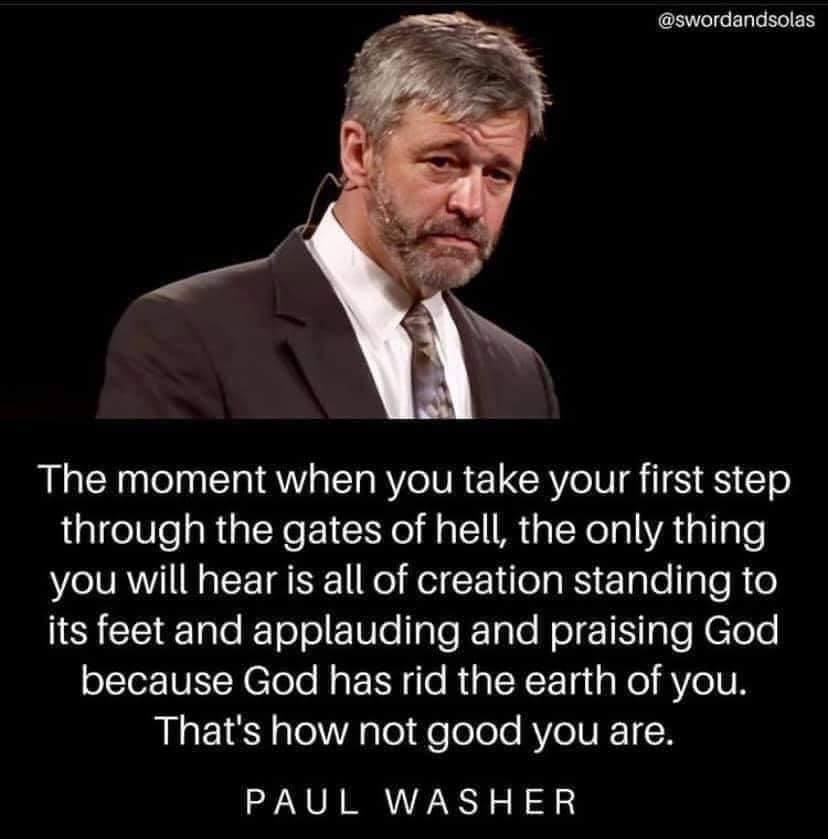
The moment when you take your first step through the gates of hell, the only thing you will hear is all of creation standing to its feet and applauding and praising God because God has rid the earth of you. That’s how not good you are. ~ Paul Washer
For most Christians, even to this day, hell is eternal. It is a place of either literal or figurative flames. Most “sophisticated” thinkers argue for figurative flames due to the grotesque nature of burning humans – magically kept alive for the sole purpose of perpetual suffering – but an eternity of existential suffering is hardly sophistication. In fact, figurative torment is not an improvement at all. It’s simply a psychological sidestep used to defend an indefensible doctrine (as well as an indefensible God).
Now, let me be clear: Not all doctrines of eternal hell are created equal (though all are equally absurd). In the quote above, Washer seems to get off on the idea that some (in all honesty, most) will be forever lost to the flames below, though he is hardly the first Christian “thinker” to become titillated at the idea. Early Church Father Tertullian swims in the same stream of calloused theological bullshit:
At that greatest of all spectacles, that last and eternal judgment how shall I admire, how laugh, how rejoice, how exult, when I behold so many proud monarchs groaning in the lowest abyss of darkness; so many magistrates liquifying in fiercer flames than they ever kindled against the Christians; so many sage philosophers blushing in red-hot fires with their deluded pupils; so many tragedians more tuneful in the expression of their own sufferings; so many dancers tripping more nimbly from anguish than ever before from applause. ~ De Spectaculis, Ch. XXX.
Today, though, most infernalists argue for a “nicer” version of hell, one that they assume gets God off the moral hook. For, you see, it’s not God that desires hell, it’s “free” human beings. Like C.S. Lewis before them, they argue that “the gates of hell are locked from the inside.” Meaning, if God could save them, God would. He just doesn’t have the key.
The problem, of course, is that anyone who would choose, as philosopher Thomas Talbott once put it, “objective horror over objective bliss,” is hardly free. In fact, they are no more free than the person who spontaneously thrusts their face into a raging bonfire for the sole sake of spiting God. As theologian David Bentley Hart so eloquently puts it:
An injured, damaged, and deluded person might behave in such a manner, but never a free person. Freely, sanely, deliberatively to elect misery forever rather than bliss would be a form of madness. To call that madness freedom, in order to soothe our consciences and to continue to reconcile ourselves to a picture of reality that is morally absurd, is to talk gibberish.
Now, one can erroneously argue, as Arminian philosopher Jerry Walls has done, that while this “face-thrusting” isn’t in and of itself a free choice, poorly chosen free decisions prior to this event led to their unfortunate self-mutilation. But such an argument just kicks the can down the road. I’m almost forced to ask: If the choice “back then” was so free – that is, free from any illusion or delusion that prevents the person from making a fully-informed choice – why did it lead to such an enslaved and deranged ultimate decision? In other words, no truly free person makes choices that eventually leads them to make the ultimate absurd choice. It’s always presupposed by some sort of enslavement or ignorance that not even a near-infinite regress satisfies.
Of course, none of this even begins to consider the interconnectedness of humanity, whether in regards to one’s volition or their happiness. That is to say, not only is it fantastically absurd to think of human freedom as totally devoid of all outside influences – friends, family members, those whom we look up to and are influenced by – but it is overwhelmingly arrogant to think we could ever find complete bliss in a heaven devoid of those we claim to love in the here and now. If, as the writer of Revelation suggests, God will one day wipe all tears from our eyes, then it is either by reconciling all whom we love, or by making us, at least in part, apathetic to the tragic fact that they are forever lost. If it is the former, fantastic! If the latter, then it is because we have become shells of our former selves, “Walking Dead” zombies stripped of everything that makes us a human being.
In this scenario, then, no matter how you slice it, heaven becomes a hell of sorts. As the sign at the gates of Dante’s Inferno reads, “Abandon all hope, ye who enter here.” Hope for reconciliation, whether loved ones are damned by God or damn themselves, is lost forever. If hell is eternal, so too is hopelessness for all those who continue to exist. The location – heaven or hell – matters not.
This is one reason why eternal hell is absurd. The other, no doubt, is that for hell to be eternal, God has to be present in it. For if God is not, then how can hell exist at all? It seems like a metaphysical absurdity. Further, how could God be “omnipresent” if God is not present in the place where most of God’s creation ends up? Again, this seems absurd, does it not?
The Eastern Orthodox – those among them who believe in the eternality of hell, anyway – have a solution to this: God is present with those in hell. Hell, for them, isn’t the absence of God; it’s experiencing the love of God as nothing but white-hot torment. Again, though, this seems like a misunderstanding or mischaracterization of human volition. It gets back to the absurd notion that truly free individuals would ever choose objective horror (hell) over objective bliss (heaven). What these folks need more than anything is liberation. They need to be freed from whatever it is that causes love to be subjectively experienced as torment. They need, as St. Paul would put it, the “wood, hay, and stubble” burned from them so that the only thing left is the precious gem they truly are.
To this end, it’s high time Christians take seriously the charges against this damnable doctrine. It’s an affront to the character of God, but more than that, an absurdity so damaging that I’m surprised more people aren’t walking away from Christianity altogether. As polls suggest, they are leaving. And for good reason. But for many, fear is keeping them trapped. As my best friend and coauthor of many of my books says, “fear is a trap and the fear of hell is the ultimate trap.” So, let’s break free from this absurd trap and condemn eternal hell to an eternity in its own flames.
If you wanna get to know me better, please follow me on social media. I’m pretty active on all platforms:
Also, if you’ve been digging my work on here, and want to see me be able to continue writing as close to full-time as humanly possible, please take a look at my Patreon page at www.patreon.com/mjdistefano. Even $1 a month helps bigly!!!














